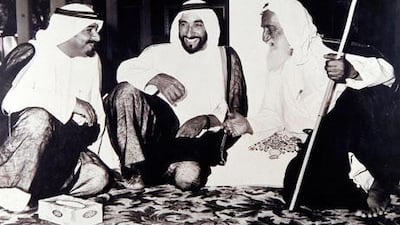AJMAN //Seated within the thick white walls of the Ajman fort, Sheikha Azza Al Nuaimi greets guests in her great-grandfather's majlis as he would have done 80 years earlier, with dates, coffee and a genuine warm welcome.
Except, she confesses, he did not use this room much. Sheikh Rashid bin Humaid, the founding father of modern Ajman, preferred to meet his subjects on a bench outside the Khalifa Grocery in the souq.
"People never had to schedule an appointment or anything, they knew he would be in the souq and they could meet him at that time," says Ibrahim Mohammed, an Ajman elder and historical consultant. "He was always available, that's what I remember, whenever people needed him."
The late Sheikh Rashid was one of the UAE's founding fathers and knew nearly every Ajmani by name, but little is known of him outside the emirate. The current royal court has now released an official biography, Rashid, Portrait of a Ruler, about the man who played a key role in the union of seven sheikhdoms.
The Crown Prince of Ajman, Sheikh Ammar bin Humaid, last week donated a biography of his grandfather to more than 500 libraries worldwide.
Relics of Sheikh Rashid's life are displayed at Ajman Museum, housed in the 19th-century fort where he was born in about 1904. Each item tells part of his story. They are not the possessions of an ostentatious ruler: a bisht cloak, a wool head scarf, thick reading glasses and a passport from 1969.
The single largest item is a plain pearling box that held his few valued possessions.
When Sheikh Rashid inherited the sheikhdom in 1928, at about the age of 24, the pearl nearly brought his people to starvation. At that time an estimated 80 per cent of Ajman's economy was dependent on the industry that collapsed with the invention of the cultured pearl.
Sheikh Rashid turned to honey and stingray exports, stamp production and oil concessions with a Texan risk-taker to finance investment in agriculture and fisheries. Any money earned was reinvested to his people. He was always mistaken for a commoner by visitors because of his humble dress and humility.
"Sheikh Rashid was always late, everywhere he was due to go, because he would stop to talk to anyone - nobles, ordinary people ... even servants. He just liked people," writes the British political agent, Sir Archie Lamb, in the biography.
"If he had a few rupees in the morning by that evening his pockets were empty as he gave money away. Those who were responsible for Ajman's finances, and his advisors, often despaired."
Sheikh Rashid played a conciliatory role in the formation of the UAE but never gave up his khanjar daggers, two of which are displayed in the museum. Each has an extra knife hidden behind the main dagger.
"This is for cutting," says Ajmani historian Ali Al Matrooshi, pointing to the hidden knife. "The dagger is for killing. He was brought up in a period of rivalries and that's why he was suspicious all the time, even of his shadow. He even looked at his shadow when he walked."
Even so, Sheikh Rashid was brave. He would chase bandits to the Empty Quarter or would track them through the desert for days. A religious man, he had a strong sense of right and wrong.
In politics, he played negotiator.
Though a favourite of the British, he turned a blind eye to Ajmani merchants who traded with Iran during the 1940s embargo and actively supported Arab League proposals to fund a road from Dubai to Ras Al Khaimah. He was steadfast in his refusal to let the British dictate Ajman's foreign affairs.
A wing of the fort displays photos of the royal family that tell the story of 20th century Ajman. In a 1970s portrait, Sheikh Rashid is in ceremonial army regalia with a checkered red kefiyeh wrapped around his head and beard. He looks visibly uncomfortable. In a candid photo, he leans on the arm of a man, laughing.
"This is one of my favourites," says Sheikha Azza, the acting director of Ajman Tourism Development.
"This person is a commoner, he's not a sheikh, and look at the body language. He was accessible in his lifestyle. He said, 'I am my father's only son, my father is his father's only son and we don't consider ourselves as a royal family, we are tribal and part of the people'."
Sheikh Rashid ruled for 53 years, passing away in 1981 aged about 77.
The biography, by historian Graeme Wilson, goes on sale in UAE book stores next month and is available online now.

